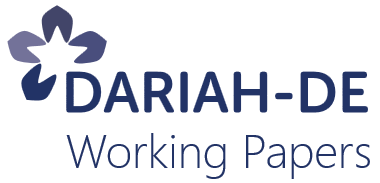Digitale Methoden und Geisteswissenschaften – in welchem Verhältnis stehen sie und wie werden sich die Geisteswissenschaften durch die neuen Methoden verändern? Dieser Frage geht eine Studie aus dem PARTHENOS-Projekt nach, das sich mit digitalen Tools und elektronischen Forschungsinfrastrukturen beschäftigt. Die Ergebnisse werden in der Publikation „Digital Humanities Foresight. The future impact of digital methods, technologies and infrastructures“ von Mark Hedges et. al. vorgestellt.
Als eine zentrale Entwicklung wird die „explosion in data available for analysis ausgemacht“:
The development of the digital humanities has been characterized by the explosion in data available for analysis: digitized collections; open data; born-digital content. There are limitations and issues in relation to these, however: there is still a need for further digitization, in particular of collections relating to marginalized groups; significant concerns have emerged about potential infringement of intellectual property rights (IPR) and the General Data Protection Regulation (GDPR); and big technology companies are raising barriers to access to their data. (S.7)
Auch in Punkto verfügbare Tools ist eine massive Entwicklung zu beobachten:
There is also a wide range of tools for analysing these data: open source software; natural language processing, machine learning, and artificial intelligence tools and libraries. Open source software enables the broad adoption of new tools and facilitates sustainability beyond a single project, while the development of software libraries for computational analysis offers the potential for widespread automated analysis. There is an important difference, however, between placing software on GitHub and ensuring it is sustainable in the long term, and there is a risk that artificial intelligence (AI) may be seen as a vague panacea for all difficulties, without the community fully understanding the potentials, limitations and biases of the tools. (S.7 f.)
Als wichtige Entwcklung werden auch Kooperationen zwischen den Geisteswissenschaften und anderen Disziplinen sowie zwischen verschiedenen Einrichtungen gesehen:
There has also been an increase in the number and variety of collaborations: interdisciplinary collaboration; intersectoral collaboration; and international collaboration. Collaborations between the humanities and other fields, universities and other sectors of society, and across national borders, are increasingly common and bring new perspectives and ideas to projects and data sets. This may be hindered, however, by humanists who are reluctant to embrace digital methodologies, a suspicion of the commercial sector, and certain restrictions on international funding. (S.8)
Die Studie geht von einer Weiterentwicklung in den Bereichen Daten, Tools und Kooperationen in dieselbe Richtung aus. Es werden aber auch einige obstacles identifiziert. Nicht zuletzt in der Finanzierung geisteswissenschaftlicher Forschung, besonders seit der Finanzkrise 2008, werden Missstände ausgemacht. Dabei wird auch kritisiert, dass einige Bereiche vor anderen privilegiert werden und dass mit dem Verlust von Forschenden aufgrund schlechter Bedingungen gerechnet werden muss. Auch der „digital divide“ – sowohl in internationaler, interdisziplinärer als auch intradisziplinärer Hinsicht – wird hervorgehoben. Zusammenfassend heißt es auch:
Five key areas were identified that should form the basis of any future research agenda for the humanities and cultural heritage sector: public engagement, research infrastructure, development of the digital commons, artificial intelligence, and impact and evaluation.(S.15)
In den DAHRIA-DE Working Papers sind inzwischen 40 Publikationen zu Themen der Digital Humanities erschienen. Sie werden unter CC-BY-Lizenz frei verfügbar veröffentlicht und an der SUB Göttingen von Mirjam Blümm, Thomas Kollatz, Stefan Schmunk and Christof Schöch herausgegeben.
zur Studie: PARTHENOS D3.3 Foresight Study and Interdisciplinary Research Agenda DOI:10.5281/zenodo.2662490
zur Publikation: Mark Hedges, David Stuart, George Tzedopoulos, Sheena Bassett, Vicky Garnett, Roberta Giacomi, Maurizio Sanesi. „Digital Humanities Foresight. The future impact of digital methods, technologies and infrastructures“ DARIAH-DE Working Papers. Göttingen: DARIAH-DE Nr. 40. Göttingen: DARIAH-DE, 2019. URN: urn:nbn:de:gbv:7-dariah-2019-12-3
PARTHENOS: parthenos-project.eu
Explosions: Ken Hermann. Die Abbildung steht unter einer CC BY-NC-ND 4.0-Lizenz.
DARIAH-DE Working Papers: DARIAH-DE. Die Abbildung steht unter einer CC-BY 4.0-Lizenz.